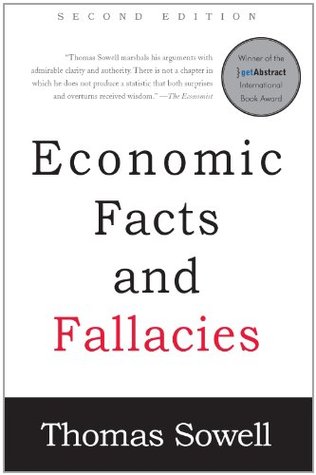More on this book
Community
Kindle Notes & Highlights
There are many reasons why fallacies have staying power, even in the face of hard evidence against them.
The imposition of rent control has been followed by housing shortages in New York, Hong Kong, Stockholm, Melbourne, Hanoi and innumerable other cities around the world.
Presidents of the United States almost routinely claim credit for budget surpluses and are blamed by their critics for budget deficits. Yet all federal government spending bills originate in the House of Representatives, and only Congress can change tax rates.
Blacks are another group adversely affected by the high housing prices created by severe building restrictions. The black population of San Francisco was reduced by more than half from 1970 to 2005, from 96,000 people to an estimated 47,000.
“San Francisco’s black population has dropped faster than that of any other large U.S. city’s,” according to the San Francisco Chronicle
Crime control can also be more costly per person in a city, where the anonymity of vast numbers of people can enable criminals to more readily escape detection than in a small community where most people know one another and a stranger stands out like a sore thumb.
Crime and violence affect the local economy more directly when riots destroy many or most of the businesses there and new businesses are afterwards reluctant to move in to replace them. As already noted, in just one decade—the 1960s—riots in Chicago’s west side destroyed or forced the abandonment of an estimated three-quarters of that neighborhood’s businesses.
The assumption that third-party observers can make better decisions than the people directly involved has produced many urban fallacies and many economic and social disasters.
“Yes, funny thing. It has among the lowest delinquency, disease and infant mortality rates in the city. It also has the lowest ratio of rent to income in the city. Boy, are those people getting bargains. Let’s see. . .the child population is just about average for the city, on the nose. The death rate is low, 8.8 per thousand, against the average city rate of 11.2. The TB death rate is very low, less than 1 per ten thousand, can’t understand it, it’s lower even than Brookline’s. In the old days the North End used to be the city’s worst spot for tuberculosis, but all that has changed. Well,
...more
During the 1960s, one neighborhood in San Francisco had the lowest income, the highest unemployment rate, the highest proportion of families with incomes under $4,000 per year, the least educational attainment, the highest tuberculosis rate, and the highest proportion of substandard housing of any area of the city. That neighborhood was called Chinatown. Yet in 1965, there were only five persons of Chinese ancestry committed to prison in the entire state of California.
For example, a study of people who had been displaced from a close-knit community in Boston found about half of them disturbed or depressed.67 While many of them found better housing elsewhere, 86 percent of them paid higher rents than before they had been forced out of their former neighborhood.68 These particular displaced people were white. Other studies show even higher proportions of displaced blacks suffering the same emotional reactions and even higher proportions of their incomes now being required to pay rent in their new homes.
They continue on in still more schemes based on similar assumptions, such as housing vouchers to enable slum dwellers to go live in middle class communities—in utter disregard of the years of sacrifice that the people in those middle class communities may have made, precisely in order to be able to afford to go live away from the hoodlums and criminals now being placed in their midst by government programs.
In Riverdale, a school “once boasting a top academic reputation” has seen its achievement levels drop, refuting “the idea that shipping poor families to good schools in the suburbs will cause an education ethic to rub off.”72 Residents of Antioch “complained of constant problems with gang members’ blaring car stereos and under-age drinking on the street.”
What is called “smart-growth” in some places is government imposition of the preferences of observers, critics, activists, or “experts” to over-ride the desires of the people themselves, as expressed in what they are willing to spend their own money to buy or rent.
In North American urban areas the movement outward in the 1920s was even more of a mass movement than in Europe. The expansion and intensification of retail and office uses in the old downtowns led to a sharp decrease in the number of people who lived at the center of cities.
In most societies, for most of history, women have earned lower incomes than men. That fact is not in dispute. What is open to question—and what has generated many fallacies—have been various attempts to explain this fact.


